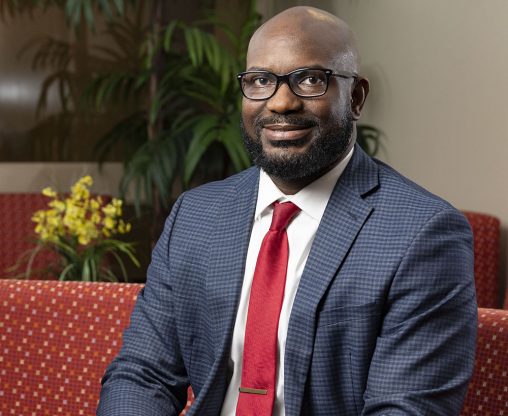
Daniel Asamoah, professor and interim chair of the Department of Information Systems and Supply Chain Management at Wright State, will work at the Ghana Institute of Management and Public Administration this summer as a Carnegie African Diaspora Fellow.
To paraphrase a well-known proverb: If at first you succeed, try, try again.
Morphing the timeless axiom seems somewhat apropos in the case of Daniel Asamoah, Ph.D., professor and interim chair of the Department of Information Systems and Supply Chain Management at Wright State University.
In 2021, Asamoah was awarded a prestigious fellowship by the Carnegie African Diaspora Fellowship Program for an educational project in Ghana.
Two years later and history repeated itself as Asamoah received the esteemed fellowship for a second time.
He credits Emmanuel Adabor, Ph.D., head of the Department of Computer Science at the Ghana Institute of Management and Public Administration (GIMPA), and Thomas Traynor, Ph.D., dean of the Wright State Raj Soin College of Business, for helping him secure the fellowship.
“I’m very excited that my proposal has been selected for the second time,” said Asamoah. “To me, this is a testament to the program’s positive reception of the work I did during the first visit to GIMPA and its impact in the analytics domain in Ghana. Out of thousands of applications, it is not a certainty that one will be selected for a second fellowship, hence I am very grateful for this second selection.”
The program is funded by the Carnegie Corporation of New York and managed by the Institute of International Education in collaboration with the United States International University – Africa. Since the program’s inception in 2013, 566 African Diaspora fellowships have been awarded to scholars to travel to Africa. Through the fellowship program, African institutions in Ghana, Kenya, Nigeria, South Africa, Tanzania and Uganda host an African-born scholar to work on projects in research collaboration, graduate student teaching and mentoring and curriculum co-development.
“Naturally, we are very proud of Daniel for this prestigious accomplishment,” said Traynor. “His selection a second time for this fellowship speaks highly for the quality of his contributions during his first term as a fellow. In addition to the benefits gained by institutions and scholars in Africa, Daniel’s participation in the Carnegie African Diaspora Fellowship program will be shared with his students at Wright State, enhancing their experience in the Raj Soin College of Business.”
Asamoah’s projects will entail teaching and research in the areas of analytics and machine learning. He will co-teach a graduate-level course in business intelligence and analytics at the School of Technology with Adabor.
The pair also are planning a workshop on “Data Analytics and Machine Learning in Ghana: Exploring the Intersection between Academia and Industry” in July. The workshop’s participants will include faculty, students and industry practitioners. Focus will be on the role of data analytics to propel socioeconomic development in Africa.
Asamoah and Adabor have also started a preliminary research collaboration in the implementation of analytics strategies in Ghana. Asamoah said he is looking forward to a deeper collaboration on that front during the summer.
A member of Wright State’s faculty for nearly a decade, Asamoah said he will personally benefit from the experience because it opens a wider horizon to his teaching and research efforts in big data, data analytics and decision support systems.
Wright State has traditionally celebrated diversity in international education and collaboration, he said.
“I hope to help deepen that tradition and cement the institution’s place on the map with regards to our international stature and role in helping shape socioeconomic development in the international space via teaching and research,” he said.
Asamoah earned his Ph.D. in management information systems and his master’s degree in telecommunications management from Oklahoma State University and his bachelor’s degree in electrical/electronic engineering at the Kwame Nkrumah University of Science and Technology in Kumasi, Ghana.
Despite growing up in Ghana, Asamoah said his first experience in the Carnegie African Diaspora Fellowship Program helped reorient him with some of the challenges one faces when conducting research or business in cultures other than the United States.
“Doing business in different parts of the world always requires open-mindedness and willingness to immerse oneself into the sociocultural fiber of the host country,” he said.
He hopes that more Wright State faculty, administrators and students have the opportunity to visit or collaborate with international institutions.
“Not only will this help create a diverse culture on campus, it will help make Wright State even more competitive in comparison with other universities around the world,” Asamoah said.

 Walking through open doors
Walking through open doors  Adventures await
Adventures await  Wright State to expand nursing facilities to meet workforce needs and prepare more graduates for in-demand careers
Wright State to expand nursing facilities to meet workforce needs and prepare more graduates for in-demand careers  Wright State student-athletes make a lasting impact on local family with more to come
Wright State student-athletes make a lasting impact on local family with more to come  Wright State names Rajneesh Suri dean of Raj Soin College of Business
Wright State names Rajneesh Suri dean of Raj Soin College of Business 